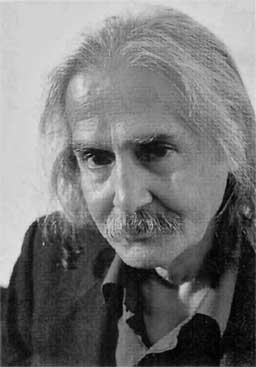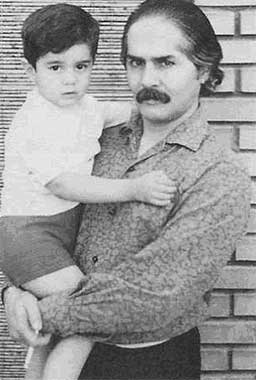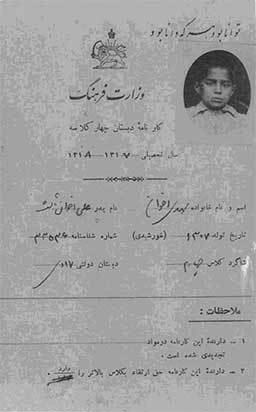 |
|
A month before his
demise. Paris, 1991 |
 |
|
Holding his second son ‘Zartosht’
Tehran, 1960 |
 |
|
Photo of Akhavan at
age 10 affixed on his 4th grade completion certificate
Mashad, 1939 |
The year 2004 marks the 75th
birth anniversary of one of Iran’s foremost poets of the 20th
Century.
The following excerpt
from ‘Peyk’ Magazine1
(May-June 2004), publication of the Persian Cultural Center of San Diego,
California is a fitting tribute to the legacy of that outstanding poet.
“His superb poetic gifts
made Mehdi Akhavan Saless a towering figure in contemporary Persian
poetry, and one with whom younger poets had to come to terms.”
“In his longer poems,
Akhavan brings together the epic tradition of Ferdowsi, the dramatic
qualities of Zoroastrian hymns – particularly the Gathas and the Vendidad
– and themes from the simple ballads and tales of the Persian oral
tradition in a light poetic structure capable of sustaining reader’s
attention and interest through the long stretches of narrative. His
shorter poems are sometimes cynical and sinister, sometimes playful and
witty, and sometimes even bitingly satirical.”
“Akhavan became known
nationally after the publication of his second volume of poetry, entitled
‘Winter’ (1956). The book was hailed as one of the most important
achievements of Nima Yushij. Subsequently, Akhavan published several
other collections, including ‘The Ending of the ShahNameh’ (1959), ‘From
this Avesta’ (1966) and ‘Autumn in Prison’ (1969).”
A native of Khorassan and
deeply versed in the literary traditions of the North Eastern part of
Iran, Akhavan remained faithful to the spirit of Khorassani poetic
conventions. He began his career as a teacher, and went on to work for the
Ministry of Education, the National Radio and Television organization,
among others. He found himself caught in the midst of the political
turmoil of the 1950s and was briefly imprisoned in 1953 following the coup
d’etat that beset Iran.
Akhavan Saless passed away
in Tehran in 1990 shortly after return from his only trip outside Iran to
Western Europe. His remains were moved to the city of Tous in Khorassan
and buried close to the mausoleum of another legendary Iranian poet
Ferdowsi. With his passage a remarkable chapter in the literary history
of Iran came to a close.
Akhavan’s lasting legacy
is his ability to influence through his poetry a generation of Iranian
intellectuals of his time to become acquainted with their proud past
despite all the negative propaganda and distortion applied to the cause of
ancient Iran.
Amongst his compositions2
one comes across “Thou this Ancient Land, I adore thee” with a
dedication that reads “To Dr. Jalil Doostkhah3
(Isfahani), and all other Nobel Spirited Iranians” The English rendition
of few of the couplets from that composition follows.
From all things earthly,
if I acclaim
Thee this land so ancient, I adore
Thee the
birth place of so many nobles
Cherisher of magnanimity, I adore
Thine Ormuzd and
Yazatas, I revere
To thine ancient
prophet
A wisdom seeking sage whom I adore
The noble
Zarathushtra, more so than
all other sages and prophets I adore
Humanity better than
him has not seen and will not
and this noblest of humanity I adore
His trios the best
guide for the world
This concise, impactful guide I adore
This great Iranian a
leader
This Iranian leader I adore
Never killed, nor asked
others to
This noble role modeling I adore
Tine Ferdowsi, the
legendary literary tower he erected
placed in the hall of fame and glory, I adore
1 The Peyk article on
Akhavan Saless was sourced from the book ‘An Anthology of Modern
Persian Poetry’ by Dr. Ahmad Karimi-Hakkak
2 His memorial book – in
Persian - produced soon after his demise ‘Bagheh bee barkee’
has an extensive collection of his poems
3 Dr. Jalil Doostkhah is
a well accomplished Iranian Avestan scholar of late 20th
century. As a student and associate of the late Professor Ibrahim
Pour-e Davoud, Dr. Doostakhah is well recognized for his contribution
to translation of the Avesta text into modern Persian.
|